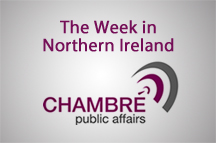.jpg) With days to go until the Northern Ireland Assembly election, the likelihood of normal government returning any time soon is fast receding.
With days to go until the Northern Ireland Assembly election, the likelihood of normal government returning any time soon is fast receding.
Coming just 10 months after Northern Ireland last went to the polls, the March 2nd election represents the sort of constitutional crisis the region specialises in.
In the midst of a controversy resulting from a botched renewable energy scheme, deputy First Minister Martin McGuinness resigned his position. His resignation, and the refusal of Sinn Féin to nominate a replacement, meant that the Executive collapsed.
The collapse was all the more surprising because it followed a period in which the two Executive parties had seemed to be working well together. Indeed, learned commentators were, just before Christmas, remarking how smoothly government in Northern Ireland was working for once!
However, the story that sparked this election has since been somewhat sidelined - in part due to strange scenes at the various manifesto launches.
Ulster Unionist leader Mike Nesbitt went first. Breaking with tradition, he announced he planned to give his second preference vote to a candidate of the nationalist SDLP.
This olive branch to his partners in opposition proved a bridge too far for some, though. His statement sparked dissension (and a resignation) from his own ranks and derision from the Democratic Unionists.
.jpg) However, the DUP themselves aren’t immune to surprises. Arlene Foster took no questions at her party’s manifesto launch, citing “man flu”.
However, the DUP themselves aren’t immune to surprises. Arlene Foster took no questions at her party’s manifesto launch, citing “man flu”.
The manifesto being launched was really an “addendum” to the 2016 manifesto. It, like the party’s election rhetoric so far, stressed the ‘threat’ to unionism posed by Gerry Adams, Sinn Féin, and their “radical republican agenda”.
Since then, the party has been put back on the defensive.
It emerged this week that the DUP received a £425,000 donation from the pro-Union Brexit group, the Constitutional Research Council, chaired by Richard Cook, a former vice-chairman of the Scottish Conservative and Unionist Party.
The money was used to fund an advertising campaign that was part of the DUP’s EU referendum campaign. This included a cover advertisement in the Metro newspaper, which is not circulated in Northern Ireland.
Nowhere can the adage “the more things change, the more they stay the same” be applied more accurately than in Northern Ireland.
An election that started with a major policy scandal has quickly reverted to type. The DUP, under pressure from all sides, has worked hard - and with some success - to reframe the election on traditional green/orange terms.
What this will mean for voter turnout is unclear. The DUP and Sinn Féin’s public ruction is likely to galvanise their traditional bases, while the other parties are also working hard to mobilise theirs.
However, whether voter numbers will be affected by electoral weariness and by the constant stream of “he said, she said” bickering remains unclear.
If voter numbers drop, it’s likely to mean no change at the top. With DUP and Sinn Féin seemingly unwilling to sit down together, the ultimate result of all this intrigue could be Direct Rule returning as soon as April.














